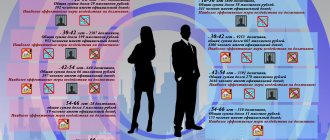Author of the article: Anastasia Ivanova Last modified: January 2021 28264
Although alimony from a military personnel is calculated in the same manner as from other citizens, the system of remuneration for military personnel is slightly different. If alimony obligations are established by the court, then the money on the basis of the writ of execution is withheld and transferred by the accountant of the military unit. If the payment procedure is determined by the alimony agreement, then a conscientious serviceman will independently transfer the money to the child. Let's consider the procedure for withholding alimony from the military.
The procedure for collecting alimony from military personnel
Money in favor of alimony obligations is withheld from military personnel serving under a contract, conscripts, military personnel dismissed due to the liquidation or reorganization of a military unit (from severance pay), military pensioners and other persons with military status.
From employees of the Ministry of Internal Affairs, fire, customs service and drug control agency, alimony payments are withheld from the official salary, salary due for rank, additional payment for length of service and other payments due to the employee.
Alimony payments from all military personnel are calculated monthly and transferred to the claimant’s account within three days after the end of the billing period. Payments for alimony obligations are withheld from the military’s official income. The collection procedure depends on whether the serviceman agrees to voluntarily pay alimony.
There are two procedures for collecting alimony:
- Voluntary agreement. If an agreement on the payment of alimony has been concluded with the second parent, the serviceman himself can submit an application for the withholding of part of the income determined by the agreement to the accounting department.
- Executive document. If the military man does not agree to pay alimony, then the claimant has the right to file a claim in court to assign alimony obligations. The court will make an appropriate decision and issue a writ of execution or a court order. This document is provided directly at the payer’s place of work or through the bailiff service.
Expert commentary
Kireev Maxim
Lawyer
In case of dismissal, citizens equated to military personnel receive a lump sum benefit, from which alimony is deducted. Payments are also deducted from monthly bonuses and other incentives. Upon retirement due to length of service, alimony is paid by the Russian Pension Fund.
Collection procedure
Just as for any other categories of citizens of the Russian Federation, the law provides for two types of solutions to the issue of alimony payment and its amount:
- payments based on voluntary consent between the child’s parents or guardians;
- determining the procedure for collecting alimony during court proceedings.
Both the first and second options for resolving the issue can be resorted to in various situations: while being married, and in the process of divorce proceedings, and immediately after a divorce, and after a while. Even if previously the second parent or guardian did not apply for payments and took all expenses on himself, he can change his decision at any time and collect alimony.
With voluntary consent, the ex-spouses or recognized parents of the child decide for themselves how, in what time frame and in what amount the funds will be transferred. The main thing is that the amount of payments does not infringe on the interests of the minor, that is, it is not less than the share of the minimum wage established by law.
A voluntary agreement can be concluded orally or signed in any form. But it will acquire legal meaning only if it is registered with a notary. Without certification of the parents' signatures on the agreement, in case of disagreement, it will not be recognized by the court, which means it will not be possible to recover the underpayment.
If the parents turned to a notary and certified the agreement, then it has the same force under the law as a court order. That is, for non-compliance, the perpetrator will be prosecuted in accordance with the established procedure.
A voluntary agreement can also be concluded with a military man. He will either transfer the money himself or transfer it against receipt from hand to hand, or he can transfer the document to the financial unit of the regiment so that the due amount is transferred from his income.
If for some personal reasons the ex-spouses cannot or do not want to enter into a voluntary agreement, then the one with whom the child lives has the right to file a claim with the court with a request to determine the amount of alimony and oblige the defendant to pay it. These issues are dealt with by the territorial sections of the World Courts. The military defendants in this case are no exception; the procedure for considering the case is the same.
Due to business trips, special duty schedules and other circumstances, the actual location of the military personnel is not always known. Therefore, the plaintiff can file a claim with the Magistrates’ Court at his place of registration. But it makes sense to try to bring information about the time and place of the hearing to the attention of the defendant. For example, call the military unit and ask to transfer it to your ex-spouse or write a letter to him at the address of the place of service. If the defendant does not appear at the hearing, the consideration of the case may be delayed. After receiving a court order (writ of execution), it is also better to try to deliver it to the place of duty yourself. Since they may not be allowed into the territory, you can send the document by Russian Post by registered mail to the unit’s accounting department.
What income is alimony levied on?
From the military, alimony payments will be deducted from all types of his permanent allowance and incentives. Both the salary for the position and title, as well as all additional payments, will be taken into account.
See also:
The procedure for obtaining a writ of execution for the collection of alimony
If a military man has other sources of income not related to his service (for example, he rents out an apartment), then it also makes sense to inform the judge about this, so that alimony is also collected from these amounts.
What income of a military personnel is not subject to alimony obligations?
The question of what is considered income to be taken into account to determine the amount of payment for child support is exhaustively defined by Government Resolution No. 841 for all categories of citizens.
But sometimes controversial issues arise regarding deductions from the military. The practice of court decisions has been accumulated on them.
The military is obliged to pay payments for alimony obligations from all types of permanent monetary allowance. In the case of military personnel, it replaces wages, which means it is intended to support the serviceman himself and his family members, including children from previous marriages.
When calculating alimony, those amounts that were not allowance but served as compensation for damage or military expenses will not be taken into account:
- payments for wounds and injuries received during service;
- reimbursement of expenses for moving to a new location;
- compensation for travel expenses;
- one-time replacement of rations or the issuance of uniforms with cash payments;
- amounts paid for moral or material damage.
Also, those cash payments that were made in connection with the military status in marital relations with other family members and new spouses will not be included in the total income:
- financial assistance regarding the death of a close relative;
- on the occasion of the next marriage and the birth of new children.
Amounts, method of receiving alimony payments
The amount of alimony payments for military personnel is the same as for civilians:
- 1/4 per child;
- 1/3 for two minors;
- 1/2 for three or more.
By agreement or by court decision, the procedure for transferring funds for the maintenance of minor children can be different: in cash from hand to hand (preferably against a receipt), by bank transfer by the payer himself, withholding through the accounting department at the place of service.
See also:
Legal procedure for paying alimony according to the demands of the second wife: grounds, consequences, calculations
Income of military personnel
Pay for those serving in the military differs from other civilian employees. Instead of wages, military personnel receive monetary allowances. Payments are made from the budget of the Ministry of Defense of the Russian Federation.
A serviceman's salary consists of:
- payment for the position held;
- payment for military rank;
- various bonuses (for conditions of service, for class, for dangerous working conditions, for length of service, for maintaining state secrets, for awards).
The full salary is formed from payments for the position and assigned rank.
Expert commentary
Potapova Svetlana
Lawyer
In addition to basic payments, military personnel are entitled to financial assistance and bonuses. Bonuses are usually awarded before a vacation, at the end of the working year, or on the occasion of a holiday or other significant event.
Financial assistance is issued upon receipt of a report from a serviceman. It is accrued due to personal circumstances, such as:
- changing of the living place;
- official transfer to another region;
- birth of a child;
- graduation from a higher educational institution;
- marriage.
If an employee is assigned the duties of an absent military personnel, on the basis of the relevant order, an additional payment is made for combining positions.
Types of income of a military man
Military personnel do not receive regular wages, like all citizens; they are paid a salary, which is paid by the Ministry of Defense of the Russian Federation.
Military personnel pay alimony from their allowance, which is formed by taking into account all allowances for the position and rank of the serviceman, as well as from various allowances.
Supplements can be transferred:
- For difficult conditions of service.
- Cool.
- For dangerous conditions of service.
- Longevity.
- Participation in various operations.
- For keeping state secrets.
- For the awards received.
In addition to the basic salary, military personnel are entitled to bonuses and financial assistance from the state. Bonuses are issued before vacations or holidays. But in order to receive financial assistance, you need to provide a report and a certificate about the reason: relocation, official transfer, birth of a child, higher education or marriage.
From what income of military personnel is alimony deducted?
The list of income from which alimony payments are allowed to be withheld is listed in Government Decree No. 841 of 1996. Alimony from a military personnel is withheld from the official salary, which includes payment for the position and rank, as well as from allowances:
- for professional excellence;
- for class;
- for length of service;
- for maintaining state secrets;
- for having awards;
- for complexity and tension;
- for service in difficult climatic conditions;
- for having an academic degree or title;
- for proficiency in a foreign language, if the position includes such responsibilities.
Alimony payments are withheld from payment for work at night, holidays and while on a business trip. A certificate of incapacity for work also requires the withholding of alimony, as does severance pay upon dismissal of a military man.
Collection of alimony from a military pension
The Resolution, in paragraph 2.a of the list of income, indicates an unequivocal answer to the withholding of alimony from a pension. It is impossible to receive payments only from a pension assigned for the loss of a breadwinner.
Pensions for military personnel, as well as monetary allowances, are paid by the Ministry of Defense; employees of the department are also involved in collecting alimony. When transferring payments from a pension, annual allowances and benefit indexation are taken into account.
Alimony payments are also made from the disability pension.
From what income of military personnel is alimony not withheld?
Government Decree No. 841 also contains a list of income from which alimony cannot be withheld. The list is duplicated in Article 101 of the Federal Law “On Enforcement Proceedings”. Types of income of military personnel from which alimony payments are not withheld:
- compensation for causing moral damage or physical harm of varying severity;
- reimbursement of expenses incurred by a military personnel for a business trip or transfer;
- financial assistance for the birth of a child, marriage, operations with a risk to life, etc.;
- funds from maternity capital.
Expert commentary
Kamensky Yuri
Lawyer
If the main part of a serviceman’s income consists of compensation for expenses incurred by the employee or one-time financial assistance, then alimony payments will not be withheld from this part.
Alimony from military pension
A special feature of military service is the possibility of retirement based on length of service. Training is also equivalent to length of service, so a soldier can retire even at 30 years old.
The following periods are taken into account when calculating length of service:
- hostilities;
- interaction with nuclear weapons;
- eliminating the consequences of a man-made disaster;
- service as a pilot, parachute jumping;
- work in high mountain areas.
The pension is assigned not only based on length of service, but also in the event of the loss of a breadwinner or disability. After retiring from military service, the alimony provider will continue to pay money for child support. But from a survivor's pension, alimony payments are not withheld.

The Pension Fund of the Russian Federation calculates and transfers alimony to the claimant on the basis of a writ of execution or a voluntary agreement. If the document is being executed by the bailiff service, the claimant has the right to petition to send it to the Pension Fund to withhold periodic payments. When the writ of execution is in the hands of the alimony recipient, he has the right to independently send it to the Pension Fund.
Alimony from a military man's pension
The specificity of collecting funds for the maintenance of minor children in the case of military personnel is that they retire earlier than other citizens.
Retirement does not mean that you no longer have to pay alimony. According to the already mentioned PP 841, when calculating obligations for the maintenance of minor children, all types of pensions, including military ones, are taken into account.
The changes that have taken place in the pension system have not yet affected the age and procedure for retirement of military personnel.
A military man can voluntarily retire with a pension after 20 years of service in the Armed Forces. This length of service also includes military service. Therefore, if a person served military service from the age of 18 and remained in the army further, then the earliest he can receive a pension is the age of 38 years.
A military man can be discharged from military service upon reaching 45 years of age and 25 years of total work experience (of which at least 12 years are in military service). But for some (higher) ranks and positions, the service life can be extended to 50 and even 65 years.
Before the specified deadlines, a military man may be dismissed due to the consequences of illness or injury, due to reorganization or layoff.
The longer a military man has served and the higher the rank (and position) he has achieved in the process of career growth, the higher the pension he receives.
The range in military pensions is very large - up to 60 thousand. But they are rarely less than 20 thousand, and the national average in 2021 is 24,000. Since October 1, 2021, they have been indexed by an average of 700-1500 rubles.
Additional payments to the pension can be for disability received in the service, participation in hostilities, awards, and ranks. Upon separation from service, a military member typically receives a substantial lump sum payment in connection with retirement.
Alimony is withheld from all these amounts.
If a military man continues to work “in civilian life,” then he is obliged to pay alimony from both his military pension and his salary.
When retiring with a disability, the court may take into account the special condition and needs of the ex-military and reduce alimony, but not cancel it.
The law does not provide for any other features of the collection of alimony from military pensioners in comparison with other (civilian) persons.
See also:
How to file a lawsuit for alimony against an unscrupulous spouse?
Amount of alimony payments
Alimony obligations of military personnel are in shared form. The maximum amount of deductions is 70% of income. The amount is determined in the magistrate's court, and can also be changed in the future at the request of the parties.
The amount of the monthly payment is determined by the court based on the following circumstances:
- financial situation of the parties;
- family composition;
- health and personal circumstances;
- other reasons.
In the event that a military man has another child in another marriage, the amount of alimony payments for the first child may be reduced by a court decision.
Expert commentary
Gorchakov Vladimir
Lawyer
According to family law, children from different marital relationships must receive at least 16.5% of alimony from a serviceman’s income. It is possible to change the percentage, but only in exceptional cases and by court decision.
Child support calculator
Amount of children:
Second parent's salary:
Deduct personal income tax from salary:
Result: rub.
Procedure for terminating alimony obligations
Reasons why the obligation to pay alimony may be terminated by agreement:
- death of one of the parties - either the payer or the child receiving alimony);
- expiration of the period of validity of the alimony agreement;
- the occurrence of other grounds provided for in the document (for example, the child’s graduation from a higher educational institution).
Alimony obligations assigned in court may be terminated in the following cases:
- the child reaches adulthood;
- acquisition of legal capacity by a child under 18 years of age;
- adoption of a child by another person;
- the court has recognized the fact that the recipient of alimony is able to work or lacks the need for material support;
- entering into a new marriage by a disabled spouse;
- death of one of the parties.
Exemption from alimony
It depends on whether alimony was paid in court or by agreement. If according to the court, then the reasons for termination of alimony obligations may be:
- Death of one of the parties;
- The child reaches 18 years of age or is previously recognized as legally competent;
- If alimony is transferred to a disabled person, then upon recovery it stops;
- If the dependent has entered into a subsequent marriage;
- The minor child was adopted by another person.
If the payment of alimony is carried out by agreement of the parties, then termination may occur:
- When the child reaches a certain time date (for example, the child graduated from school);
- The agreement itself has lost force (for example, the document has expired);
- Death of either a soldier or a child.
Separately, the court considers options when a person cannot pay alimony due to disability or loss of legal capacity. However, not any disability group can cause termination of obligations. This usually applies to groups 1 and 2. In this case, the court has the right to reduce alimony or simply exempt from payments.









